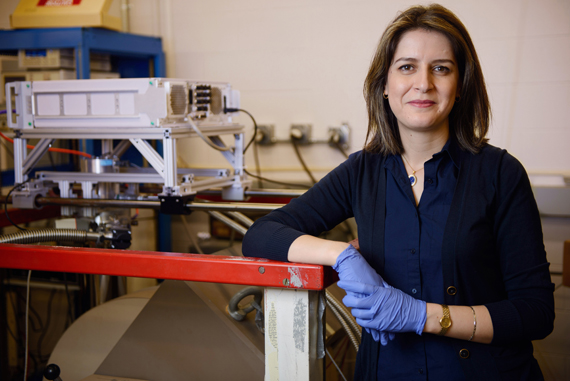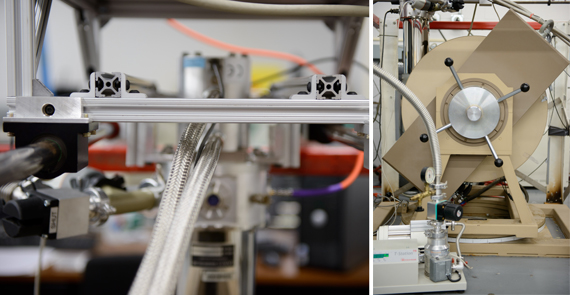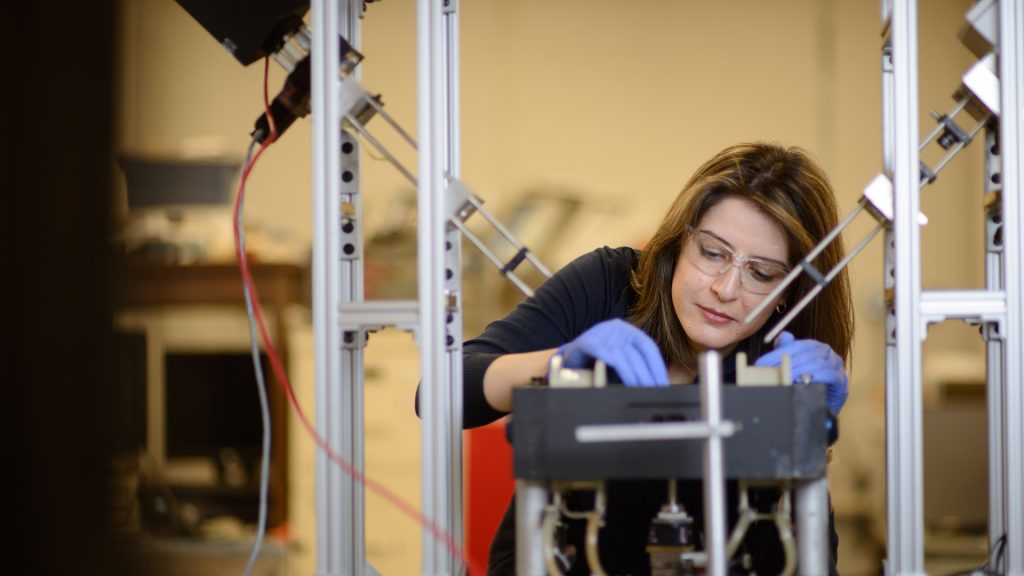For International Graduate Student, UA’s MINT Center is a Force of Attraction

“I want to explore” is a phrase Jamileh Beik Mohammadi uses often when speaking of her career and work. Still, her decision to travel from her home in Iran to The University of Alabama for her doctoral studies in physics was not easy for her, or her family.
Before she enrolled at Alabama in 2012, she had not lived further from home than Tehran, Iran’s capital city, 15 miles away. With master’s degrees in condensed matter physics and nanophysics already complete in Tehran, she needed experience in a scholarly community beyond her home country to progress in her career. Alabama offered everything she sought in a doctoral program, though choosing a school in the United States meant not seeing her family for the duration of her studies.
“I applied and got admission. Comparing the offers and research studies going on to (those at) other universities, I was financially supported and found the research very interesting at Alabama, and I was offered a graduate teaching assistantship position. So I decided to go, though it would be harder for my family and myself not to see them for a long time.”
Finding a New Home Across the Atlantic
Traveling to a new country to live and study for years requires a leap of faith.
“(You have) to trust and believe that the environment will be friendly enough to be able to continue. Back then, I was thinking maybe this would not be the case because I was going to a completely different environment. But when I came here, I found a new home,” Beik Mohammadi said.
“The campus itself is very friendly, more than I expected. I have also gotten even more interested in research. It is very satisfying and rewarding, and it helps me continue.”
When it does get difficult to continue, as can sometimes happen at the doctoral level, Beik Mohammadi says she has a support system in her adviser, Dr. Tim Mewes, professor of physics, and co-adviser, Dr. Claudia Mewes, associate professor of physics and astronomy. “Supporting me with their words and actions in those situations has always happened in the last five years,” she said.
With the Mewes’ support, Beik Mohammadi has thrived in the lab and in the greater campus community since coming to Alabama—so much so that she received the University’s Outstanding Service by a Graduate Student Award in 2017.
“Besides her excellent experimental and computational skills, over the years Jamileh has also become very active in helping other students not only in the laboratory but also across the campus and is very active in numerous outreach activities,” said Drs. Mewes.
Joining an Interdisciplinary Research Community

One of the most appealing aspects about The University of Alabama for Beik Mohammadi was the research in magnetics happening at the University’s Center for Materials for Information Technology, or MINT.
More than 40 faculty from a broad range of academic disciplines—including biological, chemical, electrical, and metallurgical and materials engineering; chemistry; geology; materials science; and physics—work together in a team environment at MINT to develop new materials for advanced data storage.
“Collaboration across disciplines is key for success in our research area of spintronics,” said Drs. Mewes. “While our focus is on understanding the underlying physical principles, we need our colleagues from chemistry, engineering and sometimes biology to successfully synthesize the materials, build the devices and test them. National labs and international collaborators are another aspect of this, as each collaborator contributes unique capabilities and knowledge that are vital for the projects.”
When Beik Mohammadi joined the team at MINT, she liked that people from different departments were looking at the same problem from different points of view and for different applications. It gave her the opportunity to explore all the research going on at the center, and then choose which direction she wanted to go.
“The use of magnetic materials to store information—this is one of the things I chose later,” she said.
Learning to Be Courageous

When Beik Mohammadi first started working at MINT, surrounded by state-of-the-art equipment, she was overcautious using the instruments.
“You really don’t want to break some fancy expensive equipment or cause damage to other people’s research because if you do something wrong with a setup and cause a piece of equipment to be down for a while, you are basically taking someone else’s time. I really didn’t want to do that, so I was too cautious at first,” she said.
Her adviser, Dr. Tim Mewes, taught her to be brave—to distinguish between things she should be careful about and things she could try for the sake of exploring.
“At the time I started working with him, he told me, ‘It’s okay if you make mistakes performing an experiment. When you go to the lab, experience as much as you want.’ This gave me more confidence. And maybe this was the reason I never made a big mistake, because I was really confident. Sometimes if you are warned too much, you make more mistakes because you are more stressed.”
The trust and support she received from her advisers has been an inspiration, and now she wants to become a professor so that she can teach others.
“I did not think about this before I came here. I did not like the teaching style that I knew before as much as I like it here,” she said. “I would like to be a professor and teach and also do research.”
Beik Mohammadi plans to complete her doctoral degree in physics in Fall Semester 2017. Most recently, she was lead author of the paper “Broadband ferromagnetic resonance characterization of anisotropies and relaxation in exchange-biased IrMn/CoFe bilayers,” which was published in Physical Review B, an international journal specializing in condensed matter and materials physics.
